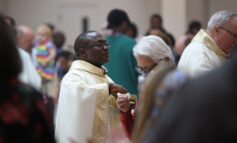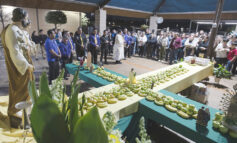
Father Jacob Dankasa celebrates Mass at St. Anthony Catholic Church in Wylie, Texas, Tuesday, March 10, 2020. (Ron Heflin/Special Contributor)
By Father Jacob Dankasa
Special to The Texas Catholic
Writing about “infection” at a time of a pandemic of great proportion like COVID-19 is almost a cliché because it’s in the minds of everyone. Let me pull us away from that negative type of infection to a more positive and desirable one. I am talking about an infection, not of disease, but of a deep-rooted personal relationship with the Lord — and this one needs to be rapidly transmitted!
As we interact with people every day, we develop relationships that influence how others perceive us. There is hardly a one-size-fits-all universal perception of any individual. People perceive us differently depending on how well they know us and the context in which they know us. Sometimes it is better not to ask people to tell us what they think about us unless we are strong enough to deal with what we will hear! In Matthew 16:13-20 Christ asked his disciples to tell him what they had heard on the street about people’s perception of him, but the more important question came when he wanted to know what the disciples, his closest companions, thought of him. Peter spoke from his personal experience of Jesus and said, “You are the Messiah, the Son of the living God.”
As Christians, this story challenges us to consider the question of our personal experience of Jesus. The important thing is not what others think about Jesus or what the scriptures say about him. What is important is our individual experience of Jesus as a believer: how do I experience him in my life? How do I explain Jesus to others from a personal point of view, not from what I hear or read about him?
For Peter, Jesus was the Messiah, the Son of God — not because he had read about him somewhere or heard about him from someone, but because he allowed himself to have a deep personal relationship with Jesus that brought him to that conclusion. Peter had a personal experience, a personal touch that came as a result of his openness to Jesus. For us to have a personal experience of Jesus we must first have a relationship with him, open to his promptings, and we must dispose ourselves to allow him to touch our innermost emotions.
For us who are Jesus’ followers today, saying that He is the Christ, the Son of God, is a repetition of a revealed truth. This statement is a fundamental fact of our belief. But beyond this, we need something more, something deeper. We need a real personal relationship that enables us to describe him in our own words, our own terms, our own situations. For example, for me, my personal relationship with Jesus makes me describe Him as a confidant that never betrays my trust, one who knows my darkest side and my weaknesses, but instead of being disappointed and abandoning me, he draws closer and encourages me to be better. He is the one that waits for me when there is no one else to relate to. He is the one who does not judge me but always cautions me. He is the one who upholds me when I am about to give up. Who is Jesus to you?
The challenge of having a personal relationship with Jesus is that his relationship with us is not selfish, and he wants us to copy his unselfishness, to share with others what we feel and experience with him. When Peter proclaimed him as the Christ, the Son of God, Jesus made him the rock upon which he would build his Church and gave him the mandate to be the harbinger of that belief, to defend it and to share it with others. It therefore means that, as Christians, we are expected to be to others what Christ is to us, because his relationship is infectious. If I truly experience Jesus and have a personal experience of him, then my faith must be translated into action, into living it out with others. If Jesus is a friend that never judges me, I should not judge others. If he is one who knows my darkest side and yet stands by me and helps me to erase my faults and become better, then I also need to stand by my friends and my family to strengthen them, despite my knowledge of their weaknesses.
I invite us to share with the world our deep-rooted personal experience of our Lord and Savior Jesus Christ, to spread the “infection.”
Father Jacob Dankasa is the parochial vicar at St. Anthony Catholic Church in Wylie.



